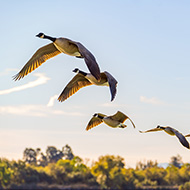Half of world’s bird species in decline, report finds

The pressures facing birds are more significant and diverse than ever.
Around half of all bird species worldwide have declining populations, according a new report from BirdLife International.
Figures from the 2022 State of the World’s Birds report reveal that 49 per cent of bird species are in decline, one in eight are critically endangered, and at least 187 bird species are confirmed or suspected to have gone extinct since 1500.
Now in its fifth year, the report highlights that pressures facing birds are more significant and diverse than ever, with agricultural expansion, logging and climate change continuing to drive this trend.
It reveals that 2.9 million birds have been lost in North America since 1970, of which the most severe have been species associated with grassland and those that migrate. A similar trend was also observed in the European Union, which has seen a a net loss of 560-620 million birds since 1980 from an area five times smaller.
Dr Stuart Butchart, chief scientist at BirdLife International, told The Guardian: “We have to stop these declines and start getting on track for recovery. Our future, as well as the world’s birds, depends on it. If we continue to unravel the fabric of life, we’re going to continue to place our own future at threat.”
Published every four years, State of the World’s Birds is BirdLife's flagship scientific publication that summarises and profiles key developments in bird science and conservation.
Since the last report in 2018, knowledge and evidence has continued to accumulate about the changing conservation status and trends of the world’s birds, the threats causing birds to decline, and the conservation actions being taken to improve their status.
In more positive findings, the report reveals that between 21 and 32 bird species would have gone extinct since 1993 - with the introduction of the Convention on Biological Diversity – without the conservation actions they received during this period.
Patricia Zurita, CEO of BirdLife International, writes in the report’s foreword: ‘This report shows how harnessing local expertise within a global framework of best practice based on sound science can be incredibly effective and impactful. We look forward to deploying our century of experience and working together with others to help turn the tide in the critical decade ahead. The birds and the rest of nature are depending on us. And we are depending on them.’



 The latest
The latest